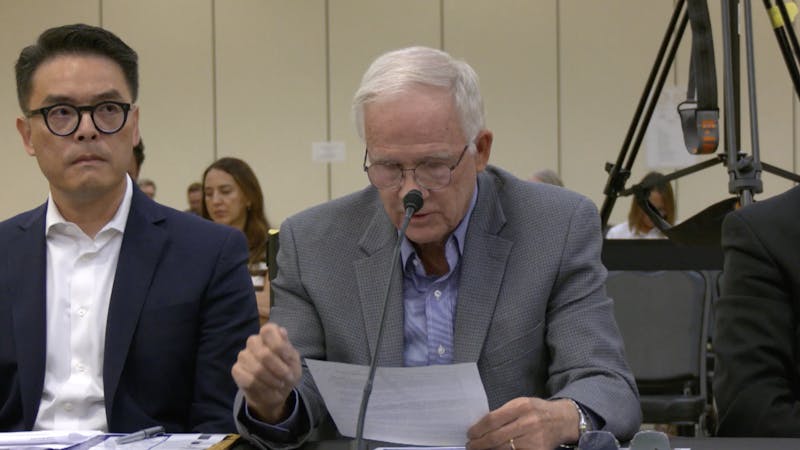Reproductive health working group announces updates

Jennifer Liu / Thresher
On Sept. 28, the reproductive health working group led by Provost Amy Dittmar and Dean of Undergraduates Bridget Gorman announced that Rice will provide educational opportunities and more accessible birth control options like Plan B on campus, the result of a collaboration with Baylor Teen Clinic. President Reginald DesRoches announced the creation of this working group in late August, after Texas’ abortion ban went into effect.
In an email to the Thresher, Dittmar and Gorman wrote that they used a questionnaire to collect the views, questions and ideas of students, faculty and staff on the topic. A review of the feedback led to the creation of a frequently asked questions section on the website.
“One theme in the responses were questions about what services and resources Rice provides, and a desire to enhance care and support for reproductive health,” Dittmar and Gorman said. “[Those responses and conversations] springboarded [a] conversation among the working group on how to expand access — which is reflected in the update message we sent to campus last week that discussed steps to increase access to sex education and birth control, including emergency contraceptives like Plan B.”
In the update, the group shared that they are working with the Baylor Teen Clinic to provide students with optional sex-education workshops, in addition to the existing Critical Thinking in Sexuality course. These workshops would include topics about healthy sexual communication, sexually transmitted infection prevention, pregnancy, abstinence and sexual engagement.
Dittmar and Gorman said that the partnership with the Baylor Teen Clinic reflects increasing attention to topics regarding sexual well-being. Early this semester, Rice admin implemented an additional optional sixth session to CTIS focused on reproductive health.
“By launching a new partnership with Baylor Teen Clinic, we are continuing this process of expanding opportunity for students to easily access programming that will discuss various topics relevant to reproductive health,” Dittmar and Gorman said. “These workshops will be held throughout the school year in the colleges.”
Additionally, the group announced that they are expanding the access to contraceptives that students currently have, such as Plan B. Those students who need financial assistance to purchase Plan B can now make an appointment with Student Health Services to request reimbursement or help making the purchase.
The reproductive health working group also announced the implementation of modified vending machines that would carry forms of birth control and wellness items at a reduced cost to the Rice community at the Student Health Services and SAFE office lobby. The group is also coordinating with the health advisors and college leadership to provide reproductive health items in residential colleges.
“The vending machines will provide access to birth control including emergency contraception such as Plan B at a reduced cost and easily available when needed,” Dittmar and Gorman said. “Similar vending machines have been installed on other campuses, and we will be working collaboratively with students and others in the community to work out the specifics of how this new resource will operate to ensure access for our community (including the exact content within the machine and pricing).”
DesRoches said supporting the Rice community in this way is important and a priority for the administration.
“The efforts by the Reproductive Health Working Group will help ensure broad reproductive health support for our students, faculty and staff,” DesRoches said. “Such support comes in many forms, including listening to people’s concerns and needs, providing answers to people’s specific questions when we can and providing resources such as access to sexual wellbeing programming and various methods of contraception.”
Dittmar and Gorman said that one prominent challenge the group will face moving forward is the evolving legal landscape in Texas.
“One current and likely ongoing challenge will be ensuring that we understand the new laws and that we help to educate our community about these laws,” Dittmar and Gorman said. “It is important that we continue to support our students, faculty and staff in an evolving legal landscape … The community at Rice — on and off campus — have been supportive of ensuring broad reproductive health support for our students, faculty and staff. There are, of course, a diversity of views on what exactly that support should entail, but overall the community has been very supportive.”
More from The Rice Thresher

Rice announces Chao College as 12th residential college
Rice announced that the 12th residential college will be named Ting Tsung and Wei Fong Chao College Aug. 19. The college, set to open in fall 2026, will contain nearly 300 on-campus beds.
Dining access fund announced following on-campus unlimited meal swipes
Rice announced new food assistance programs on Tuesday to account for the controversial change in the on-campus meal swipe plan.

Rice disaster prediction model discussed at hearing on deadly Central Texas floods
The House and Senate Select Committees on Disaster Preparedness and Flooding held a hearing on July 31 in Kerrville to address the deadly July 4 flooding in Central Texas. The flooding along the banks of the Guadalupe River killed 108 people, including 37 children. In the charged hearing, Texas lawmakers and flood survivors criticized the local response to the disaster.


Please note All comments are eligible for publication by The Rice Thresher.